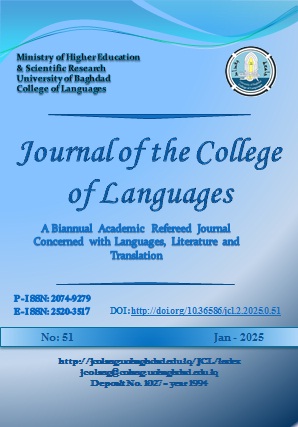Transformation of Slogans and Stereotypes in Response to Shifts in Political Discourse
Трансформация лозунгов и стереотипов при смене политического курса
DOI:
https://doi.org/10.36586/jcl.2.2025.0.51.0209Keywords:
Keywords: Comparative analysis, Discourse analysis, Political myth-making, Rhetorical framing, Анализ дискурса, Политическое мифотворчество, Риторическое фреймирование, сравнительный анализ.Abstract
This study examines the transformation of political slogans, clichés, and stereotypes in Russia and Iraq during periods of political regime change in the late 20th and early 21st centuries. The main objective of the work is to identify and comparatively analyze the linguistic and cultural changes that accompanied political transformations in both countries. The research is based on theoretical concepts of political myth, framing, and critical discourse analysis. The research methodology includes content analysis of political texts, comparative analysis of linguistic transformations, and analysis of statistical data on cultural consumption. The main hypothesis is that, despite the presence of common trends in linguistic and cultural changes due to global processes of democratization and globalization, the specific forms and dynamics of these changes differ significantly depending on the national context. The results of the study demonstrate that both countries experienced processes of de-ideologization of socio-political vocabulary, democratization of public rhetoric, and pluralization of worldviews. However, significant differences were also revealed, particularly in the nature of language policy and the role of religion in public discourse. The study contributes to understanding the mechanisms of interaction between language, culture, and politics in conditions of radical social transformations and can be used to predict the socio-cultural consequences of political changes.
Аннотация:
Данное исследование посвящено анализу трансформации политических лозунгов, клише и стереотипов в России и Ираке в периоды смены политических режимов конца XX - начала XXI веков. Основная цель работы заключается в выявлении и сравнительном анализе лингвокультурных изменений, сопровождавших политические преобразования в обеих странах. Исследование опирается на теоретические концепции политического мифа, фреймирования и критического дискурс-анализа.
Методология исследования включает контент-анализ политических текстов, сравнительный анализ лингвистических трансформаций и анализ статистических данных по культурному потреблению. Основная гипотеза состоит в том, что, несмотря на наличие общих тенденций в лингвокультурных изменениях, обусловленных глобальными процессами демократизации и глобализации, конкретные формы и динамика этих изменений существенно различаются в зависимости от национального контекста.
Результаты исследования демонстрируют, что в обеих странах наблюдались процессы деидеологизации общественно-политической лексики, демократизации публичной риторики и плюрализации мировоззрений. Однако выявлены и существенные различия, в частности, в характере языковой политики и роли религии в общественном дискурсе. Исследование вносит вклад в понимание механизмов взаимодействия языка, культуры и политики в условиях радикальных общественных трансформаций и может быть использовано для прогнозирования социокультурных последствий политических изменений.
References
Saddam Hussein, Former President of Iraq (1979-2003). (July 2024). Retrieved from lenta.ru: https://lenta.ru/lib/14159682/full.htm
Al-Ali, Z. (2014). Competing narratives and the Iraq War: Debating the British involvement. Middle East Critique, 23(2), 203-218.
Al-Marashi, I. (2018). The geopolitical context of the Iran-Iraq War, 1967-1988. Edinburgh University Press.
Bengio, O. (2012). The Kurdish Spring. The National Interest, 117, 8-17.
Bonnell, V. (1999). The iconography of the worker in Soviet political art. In S. White & P. Kenez (Eds.), Political culture and civil society in Russia and the Soviet Union. Palgrave Macmillan.
Bottici, C., & Challans, T. (2006). Rethinking political myth: The clash of civilizations as a self-fulfilling prophecy. Retrieved from https://doi.org/10.1177/1368431006065715
Britannica, T. E. (n.d.). Iran-Iraq War. Retrieved from https://www.britannica.com/event/Iran-Iraq-War
Dixon, J. (2017). Discourse, dictatorship and deception: Controlling the story in post-Soviet Russia. ECPR Press.
Entman, R. (1993). Framing: Toward clarification of a fractured paradigm. Journal of Communication, 43(4), 51-58.
Fairclough, N. (1989). Language and power. London: Longman.
Gudkov, L. (2004). Negative identity: Statuses, attitudes and values among the Russian people in the aftermath of the reforms of the 1990s. Russian Social Science Review, 45(3), 3-26.
Ihsan, B. (2015). Comprehending demonization in Iraq: Saddam Hussein and political myth-making. Totalitarian Movements and Political Religions, 16(1), XX-XX.
Ingram, H. J. (2020). The ISIS reader: Milestone texts of the Islamic State movement. Oxford University Press.
Janks, H. (1997). Discourse, power, and resistance: A critical discourse analysis of students' talk about language. Language and Education, 11(3), 161-184.
Kotkin, S. (1995). Magnetic mountain: Stalinism as a civilization. University of California Press.
Kuzio, T. (2022). Dark duality: Revolution and counterrevolution in Ukraine. Routledge.
Laruelle, M. (2009). In the name of the nation: Nationalism and politics in contemporary Russia. Palgrave Macmillan.
Mendelson, S. E. (2005). Searching for a post-Cold War foreign policy legitimacy. The Washington Quarterly, 28(2), 107-130.
Mohammed, M. (2019). News article. Reuters.
Riordan, J. (2007). Propaganda and nation-building in the Soviet Union. In R. T. Mattson (Ed.), Soviet and post-Soviet politics. Edwin Mellen Press.
Samer. (2010). Iraqi laws. Retrieved from https://wiki.dorar-aliraq.net/iraqilaws/law/6720.html
Scherr, A. (2017). The Russian dialectic: Moscow conceptualists reckon with Soviet postmodernity. De Gruyter.
Tarrow, S. G. (2010). The strategy of paired comparison: Toward a theory of practice. Comparative Political Studies, 43(2), 230-259.
Tsygankov, A. P. (2021). The dark double.
Warrick, J. (2022). Black flags: The rise of ISIS. Random House.
White, S. (1990). Gorbachev in power. Cambridge University Press.
Aron, R. (2003). Democracy and totalitarianism. Moscow: Nauka.
Bushev, A. B. (2004). Historical analysis of Pentagon public relations in covering the military operation in Iraq. In Actual problems of communication theory. Saint Petersburg: SPbSPU Publishing.
Gerasimov, O. (2004). Iraqi oil. Moscow: INFRA.
Dydko, S. N. (2003). Russia in the socialist era: Educational and lecture course for secondary school students and university students. Moscow: Prosveshchenie.
Matuzov, N. I., & Malko, A. V. (1997). Political and legal regimes: Topical aspects. Social Sciences and Modernity, 1.
Chudínov, A. P. (2006). Political linguistics. Moscow: Flinta.
Sztompka, P. (1996). Sociology of social change. Moscow: Aspect Press.
Downloads
Published
Issue
Section
License
Copyright (c) 2025 Journal of the College of Languages (JCL)

This work is licensed under a Creative Commons Attribution 4.0 International License.








